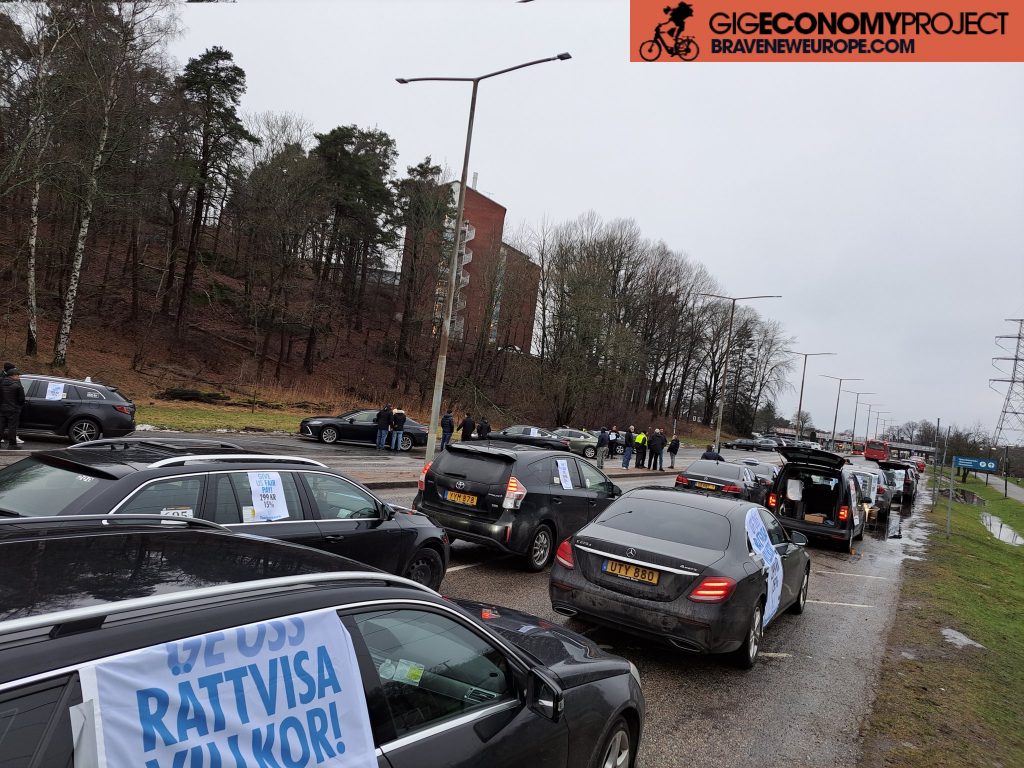Greta Thunberg joined the strike protest in central Stockholm demanding improvements to pay and union representation

AROUND 500 Uber and Bolt drivers went on strike in the Swedish capital, Stockholm, on Tuesday [10 January], a first for the Scandinavian country.
The strike was organised by the newly formed Taxiunionen (‘Taxi Union’), and lasted 24 hours. Protests also took place in Malmö and Gothenburg, and the union says it now has members in 14 cities across Sweden.
A lively protest with cars honking took place through the streets of Stockholm, with one placard reading: “Game over Uber”. Drivers protested outside Uber’s office earlier in the day, and also attended a meeting in Bolt’s office.
60 taxibilar på Sveavägen nu som genom Taxiunionen strejkar för bättre villkor hos Uber och Bolt. Chaufförer från Taxi Sthlm mfl kör förbi och visar solidaritetstecken genom rutorna. Riktigt mäktigt. @gigwatchse pic.twitter.com/rfdR0gsfGm
— Lotta Ilona Häyrynen (@LottaIlonaH) January 10, 2023
In November, Taxiunionen sent a letter to the two platform companies calling for prices to be urgently raised to increase driver pay. They want the standard price for a 10 kilometre journey to be raised from SEK 179 to to SEK 299, which is €26.56.
Taxiunionen also wants Uber and Bolt’s commission on each trip reduced to 15 per cent from 25 per cent, and that the platforms recognise Taxiunionen as the drivers’ union representatives.
Uber launched in Sweden in 2014. The drivers operate as independent contractors, meaning they have no access to social security benefits like sick leave and holiday pay and have no collective bargaining agreement, unlike the majority of Swedish workers under the ‘Swedish model’.
“Those working full time to support their families as taxi drivers for the apps need to work between 10 and 13 hours every day and most of them work 6 or 7 days a week and then they only earn SEK 18000 before tax,” John van Dinther, a driver and spokesperson of Taxiunionen, told Sveriges Radio.
Catherine Lind, a striking Uber driver, said: “Uber wants to bring in more cars and for us to run as many trips as possible. They only care that the passengers are happy, but what about us who drive? It’s scary when we struggle with our trips [and] at the same time we’re losing money on them.”
Jacob Lundberg, member of the activist group GigWatch, who the Gig Economy Project interviewed last year, said to Flamman that he joined the taxi protest to oppose “the large technology companies that have introduced digital slavery in the taxi industry”.
“People can work 60-70 hours a week for a meagre salary,” he added, explaining that the drivers don’t just want higher pay but “leisure time” so they can “be with [their] families”.
Rasmus Emil Hjorth, a Danish food delivery courier for Just Eat, who was fired from Wolt for union organising, spoke at the demonstration, telling the drivers that both food delivery and private hire platforms “play on our precarity, rather than paying us a living wage”.
He added: “I know how difficult this work can be – long work days and little time to see your family.”
Spoke at the first platform strike in Sweden for Uber Drivers. What a historic moment. pic.twitter.com/i8Ueutn1fm
— Rasmus ‘Gazellen’ Hjorth (@fodsl3) January 11, 2023
Hjorth was part of a Danish delegation which raised 1000DKK in support of the Stockholm strike.
The protest in central Stockhom was also attended by world renowned Swedish climate activist Greta Thunberg.
Träffade Greta Thunberg på Taxiunionens strejk mot Uber och Bolt. Fantastiskt att se medlemmar från Fridays for Future också stötta arbetare mot gigekonomin. pic.twitter.com/JyiZp6XtOO
— Lotta Ilona Häyrynen (@LottaIlonaH) January 10, 2023
Peter Löfstrand, Uber’s Nordic Manager, told Flamman after the protest: “We think that one dissatisfied driver is one too many and therefore we have recently had a constructive conversation with a number of drivers, who visited us a few weeks ago to give their views, which we then took into account today when we had a meeting with additional drivers.”
To sign up to the Gig Economy Project’s weekly newsletter, which provides up-to-date analysis and reports on everything that’s happening in the gig economy in Europe, leave your email here.


Be the first to comment